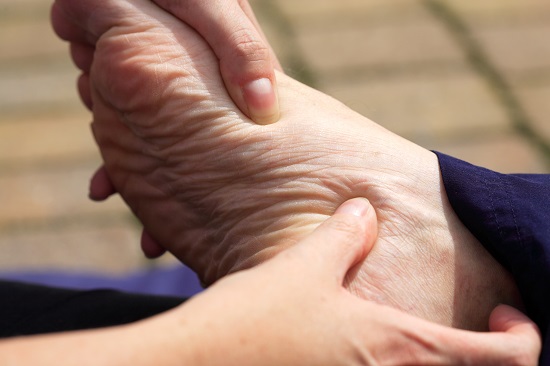Positive Health Online
Your Country

What is a Sprain?
listed in bodywork, originally published in issue 235 - January 2017
A Sprain is when the Ligament(s) at a joint (any joint) are injured. The Ligament’s job in the body is to support the internal organs and join Bone to other Bone. They restrict movement at the joint, to allow safe Range of Movement within the joint. The most common injury to a ligament is overstretching of the tissues; their ability to do the job they were designed for is compromised.

Ligaments are made up of tough fibrous bands of Connective Tissue. Fibrous tissue is strong and made up primarily of Collagen fibres. These fibres have limited elasticity, and when injured are slow to repair (due to a poor blood supply), taking anything from six weeks to a year to heal depending on severity of the injury.
Most people at some time during their lives will suffer from a Sprain; the most common is likely to be at the Ankle, but, can also be the shoulder, elbow, knee, any joint. A Sprain is generally caused by some form of trauma, which occurs when either taking part in some form of physical activity, e.g. running (especially on uneven ground), when jumping and/or landing badly. It can also happen during an everyday activity, doing something as simple as stepping off the pavement and planting the foot at an angle.

When a ligament is overstretched, and because they have limited recoil, the tissues affected stay overstretched, thus causing instability in the damaged joint. In the case of a Sprained Ankle, this can cause the ankle to become unstable. If not properly rehabilitated once healed, it is likely that the ankle will be reinjured again at some time in the future.
Once an injury has occurred at the ankle, the first response of the body to trauma is usually pain, followed by swelling, and then an inability to bear weight. Again, the time frame of healing will be dependent upon the severity of the sprain and the age of the person affected; (a severe sprain can take up to 12 months to heal). Generally the older you are the longer it will take to get better.
Although for most people it doesn’t take long to ‘feel’ better; during the healing phase your body will have made adjustments, and the longer the healing phase takes the more likely that there could be changes in your body’s alignment e.g. compensating by putting more weight through the non-injured leg, which can lead to knee, hip and back pain if the changes are not rectified once the body has recovered from the injury.

So, although the Sprained Ankle itself may not have been a bad injury, you still need to make sure you get rehabilitation to strengthen the weakened lower leg once healed, and ensure the body’s alignment has adjusted back to its normal default position. If no rehabilitation is carried out then the chances of future problems are increased.
Comments:
-
No Article Comments available